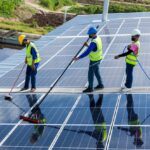As South Africa has been struggling with load shedding and will do so for the foreseeable future, solar power has emerged as a frontrunner in the race to combat climate change. Solar panels, the backbone of solar energy systems, are crucial in harnessing the sun’s energy. However, for solar panels to operate at peak efficiency, they require regular maintenance, including cleaning. In this article, we will explore the importance of clean solar panels and provide a comprehensive guide on how to clean them effectively.
Why Clean Solar Panels?
Solar panels are exposed to various environmental elements such as dust, dirt, bird droppings, leaves, and pollution. Over time, these elements accumulate on the surface of the panels, reducing their efficiency. Dirty solar panels can decrease energy production by up to 25%. Regular cleaning not only ensures optimal energy generation but also prolongs the lifespan of the panels, making it a vital aspect of solar maintenance.
Clean solar panels directly translate into increased energy generation. For South Africans who enjoy some of the best sunlight on the planet, this means higher energy output, leading to reduced electricity bills. The financial factor is significant, making regular cleaning a necessary move to get the best bang for your buck. By investing time in proper solar panel maintenance, individuals and businesses alike can enhance the value received from solar panels significantly.
How Often Should You Clean Solar Panels?
The frequency of cleaning solar panels depends on the area’s climate and the surroundings. In areas prone to heavy pollution or dust, more frequent cleaning may be necessary. Generally, it is recommended to clean solar panels at least twice a year, preferably in the spring and autumn when the weather is mild.
How to Clean Solar Panels
Safety First:
Before you start cleaning, ensure your safety. Turn off the solar panel system to avoid electric shock. If the panels are installed on the roof, use proper safety gear, including a harness and sturdy ladder.
Gather Your Supplies:
You will need a bucket of warm, soapy water (mild dish soap works well), a soft sponge or cloth, and a squeegee. Avoid using abrasive materials or harsh chemicals, as they can damage the solar panel’s surface.
Remove Loose Debris:
Begin by gently removing any loose debris such as leaves or twigs using a soft brush or leaf blower. Do this carefully to prevent scratching the panels.
Clean with Soapy Water:
Dip the sponge or cloth in the soapy water and gently scrub the surface of the solar panels. Make sure to cover the entire surface, paying extra attention to areas with stubborn stains. Avoid using excessive force to prevent scratches.
Rinse Thoroughly:
After scrubbing, rinse the panels with clean water using a hose or a bucket. Ensure that all soap residues are washed away.
Use a Squeegee:
For larger solar panel arrays, using a squeegee can help remove excess water and prevent water spots. Start from the top and pull the squeegee down gently, wiping it with a clean, dry cloth after each pass.
Dry Panels:
Allow the panels to air dry completely before turning the solar system back on. Drying panels in direct sunlight can lead to water spots, so it’s best to clean them early in the morning or late in the afternoon.
Monitor Performance: After cleaning, monitor the solar panel system’s performance to ensure that it is generating the expected amount of energy. If you notice a significant increase in energy production, it indicates that cleaning has positively impacted the system’s efficiency.
Benefits of Clean Solar Panels
- Increased Energy Yield: Clean panels absorb more sunlight, generating higher energy yields. This surplus electricity can be sold back to the grid through net metering programs, creating an additional revenue stream.
- Extended Lifespan: Regular cleaning prevents damage, extending the lifespan of solar panels. This longevity maximizes the return on investment, allowing South Africans to enjoy cost savings for years without significant maintenance expenses.
- Eco-Friendly Image: For businesses, showcasing a commitment to clean energy and environmental responsibility can attract eco-conscious consumers. This positive image can lead to increased customer trust and loyalty, ultimately boosting profits.
Additional Tips for Cleaning Solar Panels
- Regular Inspection: Besides cleaning, regularly inspect the panels for any signs of damage or wear. Cracks, hot spots, or discoloration could indicate a problem that needs professional attention.
- Professional Cleaning: If your solar panels are installed in a location that is difficult to access or if you’re uncomfortable with the cleaning process, consider hiring professionals. They have the expertise and equipment to clean solar panels safely and efficiently.
- Invest in Self-Cleaning Panels: Some manufacturers offer self-cleaning solar panels with special coatings that repel dirt and water, reducing the frequency of manual cleaning. While these panels are more expensive, they can save time and effort in the long run.
- Consider Weather Conditions: If you live in an area with frequent rain, the panels may get naturally cleaned. However, rainwater might not remove stubborn stains, so periodic manual cleaning is still necessary.
Conclusion
Cleaning solar panels is a simple yet crucial task in ensuring the efficiency and longevity of your solar energy system. By following the proper cleaning techniques and schedule, you can maximize energy production, reduce your electricity bills, and contribute to a greener planet. Regular maintenance, along with a vigilant eye for any signs of damage, will keep your solar panels operating at their best, allowing you to enjoy the benefits of clean and sustainable energy for years to come.
